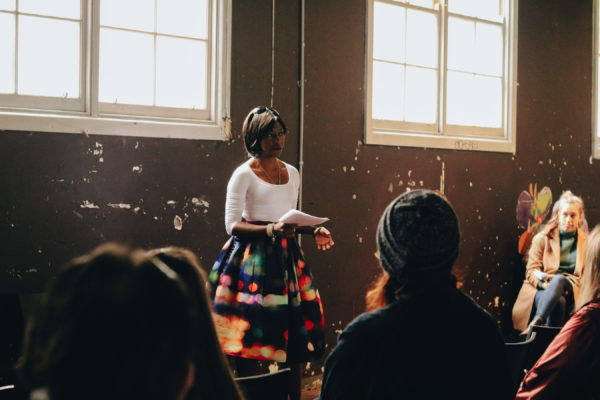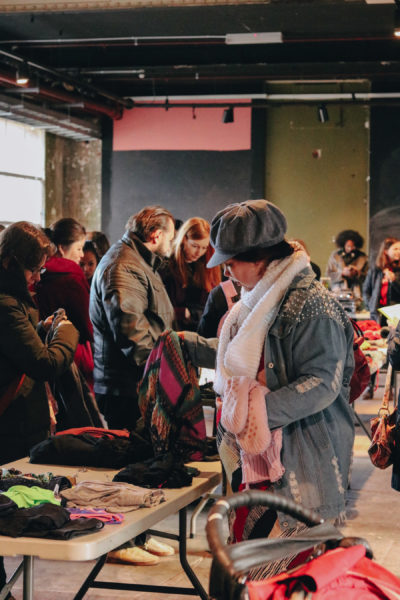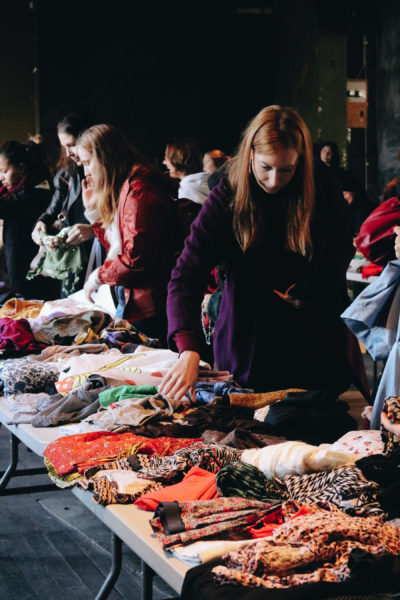As a community organiser, there are no sweeter moments in my job than the buzz and feeling of satisfaction you have after attending a successful community event, particularly when the event is successful because of the hard work and creativity of your volunteers. I was lucky to have had this feeling recently after an event in Melbourne – a clothes swap to put the spotlight on the links between the fast fashion industry and the women’s rights impacts of huge trade agreements.
But how does swapping clothes and updating your wardrobe have an impact on seemingly abstract, lofty concepts like trade deals, and why were our volunteers’ community connections so critical for the success of the event?

📷Maria Nguyen
We launched our new campaign to #TransformTradeforWomen in May.
Research showed us that so-called “free trade deals”, deals made between two or more countries to increase economic growth and foreign investment by reducing ‘barriers to trade’ like taxes on imports and giving more rights to corporations, were having serious impacts on women’s rights around the world.
These impacts include:
- Reducing women’s access to decent work by allowing corporations to get away with employing women in poor, insecure and sometimes unsafe working conditions and paying low wages, and exposing women-led businesses and agriculture to competition from multinational corporations;
- Threatening public services essential for achieving gender equality by encouraging privatisation and reducing government revenue;
- Exploiting vulnerable groups like temporary migrant workers by increasing temporary migration to Australia without adequate worker’s protections; and
- Prioritising corporate interests over the public good, for example, by giving corporations the right to sue governments if they introduce measure which might affect their profits, eg. raising the minimum wage.
The impact that big corporations are having on women’s access to decent work has also been highlighted by campaigns like #WhatSheMakes that draw attention to the poor working conditions imposed on women working in the garment sector in countries such as Bangladesh and Vietnam. The push for shoppers from countries like Australia to be more conscious of our power as consumers has led to calls for fashion to become more sustainable and more ethical.
Clothes swaps are one initiative that aim to promote more sustainability and consciousness about the people who make our clothes. The concept is simple – everyone brings a selection of clothes from their wardrobe which they are happy to part with and they swap them for the clothes brought by other people which they like. Not only do you get to clean out any clothes you might not wear very often, you get to replace them with the pre-loved clothes of others!
During a planning meeting for the #TransformTradeforWomen campaign, our volunteers had the idea to hold clothes swaps to draw attention to the campaign and the ways that large garment manufacturing companies exploit women in lower income countries. As a community organiser, it’s so great to hear our volunteers’ creative ideas – they know their communities, and the types of events and actions that would work most effectively in them, best! Together with our volunteers in Melbourne, we all agreed to organise a clothes swap to launch the campaign.

📷Maria Nguyen

📷Maria Nguyen
We held the clothes swap at the Abbotsford Convent, an iconic community space in Melbourne. We started the introductory session with a presentation from ActionAid Australia about the campaign and a very special guest speaker, Nina Gbor of Eco Styles who spoke about her work as a personal stylist with a focus on sustainability and background in international development. Thanks to the hard work of our volunteers who put up posters, distributed flyers and promoted the event through their networks beforehand, we had almost 70 people attend the event and 8 volunteers helping on the day who introduced people unfamiliar with ActionAid to the organisation and put a friendly face on the campaign.
Knowing your community and what issues and types of events resonate with them is the key to successful community organising – our volunteers and their knowledge and connections were without a doubt the most important reasons our event was so successful. Choosing to run a clothes swap to link fast fashion with the negative impacts of trade deals on women’s working conditions is just one great example of how our activist network is making an enormous contribution to the work of ActionAid Australia.
Find out more about #TransformTradeforWomen